Refrigeration Cycle
Deciphering Heat Pumps’ Role in Environmental Impact

In our pursuit of environmental preservation, we frequently encounter a dilemma. While we require effective heating and cooling systems for comfort, we also have to take into account the environmental ramifications of these technologies.
Enter heat pumps, a technology that promises both comfort and sustainability. In this article, we will delve into the role of heat pumps in environmental impact, exploring their efficiency, benefits, and ways to mitigate emissions.
Together, let’s decipher the true potential of heat pumps in serving our planet.
Key Takeaways
- Heat pumps are an efficient and environmentally friendly way to heat and cool spaces, with the potential to reduce carbon emissions by up to 50% compared to conventional cooling methods.
- Heat pumps offer a significant improvement in efficiency compared to traditional methods, with higher coefficient of performance (COP) values indicating better efficiency.
- While heat pumps may have higher upfront installation costs, long-term energy savings can offset these expenses, and various incentives and rebates are available to reduce the initial investment.
- The choice of refrigerant in heat pump systems is crucial, as low-GWP refrigerants are preferred to minimize environmental impact, and the phase-out of high-GWP refrigerants is necessary to promote sustainability.
The Basics of Heat Pumps’ Refrigeration Cycle
We’ll now explore the basics of a heat pump’s refrigeration cycle. Heat pump technology is an efficient and environmentally friendly way to heat and cool spaces. Understanding the refrigeration process is essential for maximizing the performance of heat pumps.

The cycle starts with the evaporator coil, where the refrigerant absorbs heat from the surrounding air or water. The refrigerant then enters the compressor, which increases its pressure and temperature.
Next, the hot refrigerant flows through the condenser coil, where it releases heat into the air or water. Finally, the refrigerant passes through the expansion valve, which reduces its pressure and temperature, preparing it to repeat the cycle.
Understanding the Environmental Impact of Heat Pump Cooling
Our analysis reveals the significant reduction in greenhouse gas emissions associated with heat pump cooling. By utilizing carbon neutrality and renewable energy sources, heat pumps offer a sustainable solution for cooling needs.
Here are three key points to help you understand the environmental impact of heat pump cooling:

-
Energy Efficiency: Heat pumps use significantly less energy compared to traditional cooling systems, resulting in lower greenhouse gas emissions. This energy efficiency is achieved through the transfer of heat rather than the generation of cold air.
-
Reduced Carbon Footprint: Heat pumps have the potential to reduce carbon emissions by up to 50% compared to conventional cooling methods. This reduction is due to their reliance on renewable energy sources such as solar or geothermal energy.
-
Sustainable Cooling: By harnessing renewable energy, heat pumps contribute to a more sustainable future. They align with the goal of reducing dependence on fossil fuels and promote a transition towards cleaner and greener technologies.
Analyzing the Efficiency of Heat Pump Heating and Cooling
Heat pump heating and cooling systems offer a significant improvement in efficiency compared to traditional methods. To analyze the efficiency of these systems, heat pump performance and energy consumption analysis are crucial.
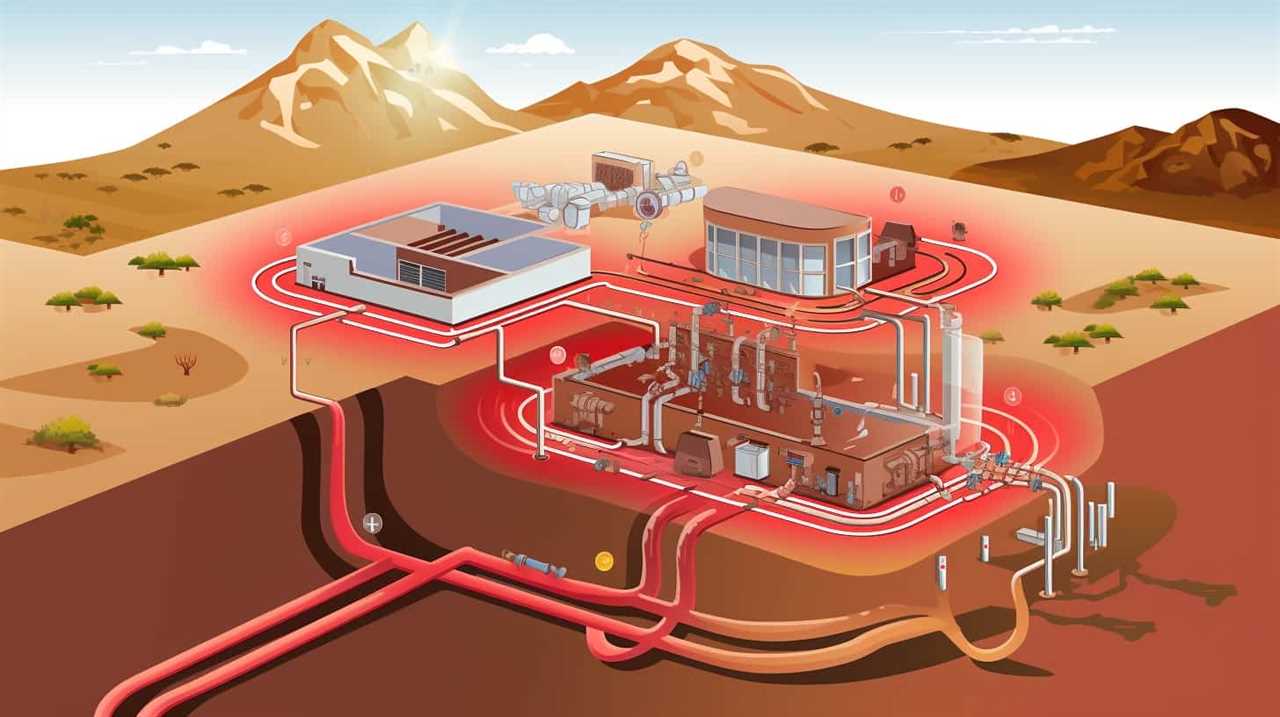
Heat pump performance is typically measured by the coefficient of performance (COP), which is the ratio of heat output to the energy input. A higher COP indicates better efficiency.
Energy consumption analysis involves evaluating the amount of energy consumed by the heat pump system during operation, including electricity usage and any auxiliary energy required.
Evaluating the Environmental Benefits of Heat Pumps
When evaluating the environmental benefits of heat pumps, it’s important to consider their efficiency and compare their carbon footprints to other heating and cooling systems.
By analyzing the efficiency of heat pumps, we can determine how effectively they convert energy into heat or cool air, reducing wasted energy and minimizing environmental impact.
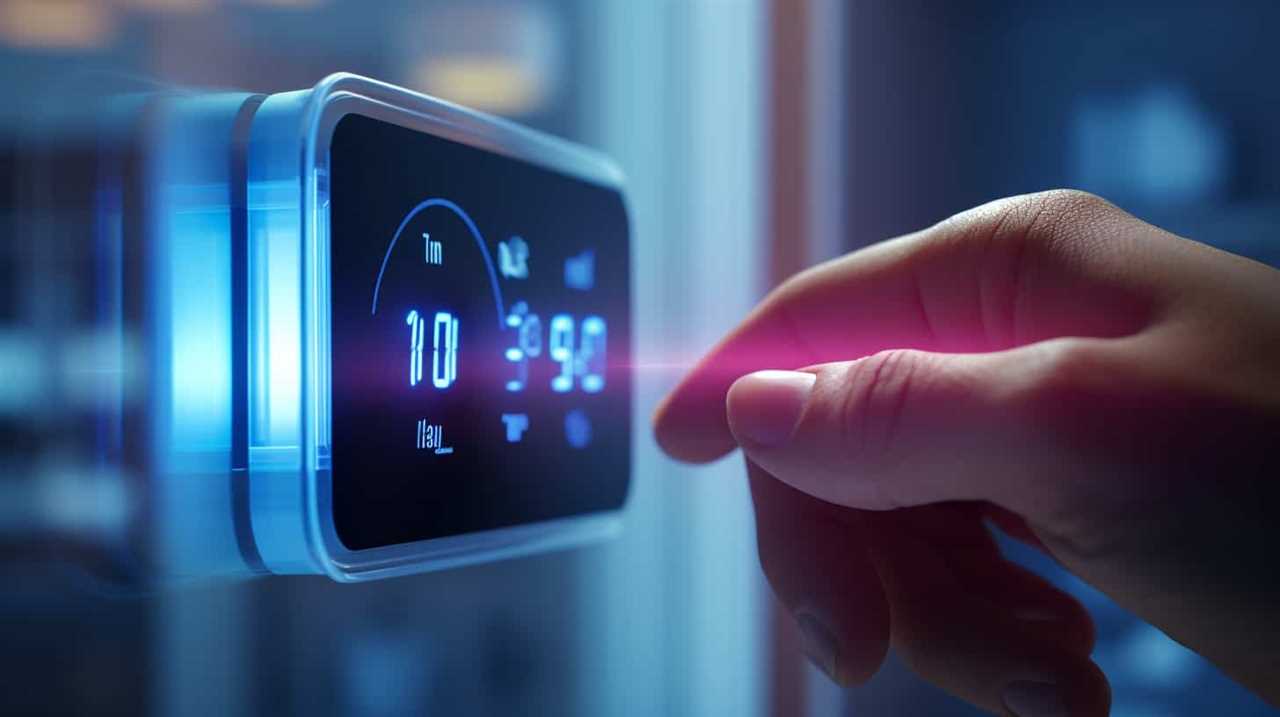
Additionally, comparing the carbon footprints of heat pumps to traditional systems allows us to assess their potential for reducing greenhouse gas emissions and contributing to a more sustainable future.
Heat Pump Efficiency
We can assess the environmental benefits of heat pumps by evaluating their efficiency. Here are three key factors to consider when evaluating heat pump efficiency:
-
Energy Consumption: Heat pumps are known for their energy efficiency compared to traditional heating and cooling systems. They can extract heat from the air or ground, requiring less energy to provide the same level of heating or cooling. This results in lower greenhouse gas emissions and reduced reliance on fossil fuels.
-
Installation Costs: While heat pumps may have higher upfront installation costs compared to traditional systems, their long-term energy savings can offset these expenses. Additionally, there are various incentives and rebates available that can help reduce the initial investment.

-
Environmental Impact: The higher efficiency of heat pumps leads to a significant reduction in carbon emissions, helping combat climate change. By using renewable energy sources, such as solar or wind power, in conjunction with heat pumps, we can further minimize the environmental impact and create a more sustainable future.
Carbon Footprint Comparison?
By comparing carbon footprints, we can evaluate the environmental benefits of heat pumps. Conducting a carbon footprint analysis allows us to quantify the amount of greenhouse gas emissions produced by different heating systems, including heat pumps. This type of assessment is crucial in determining the environmental impact of heat pumps and their potential contribution to reducing carbon emissions.
The results of such analysis provide valuable insights into the effectiveness of heat pumps in mitigating climate change and improving air quality. By comparing the carbon footprints of heat pumps to conventional heating systems, we can identify the superior environmental performance of heat pumps.
This data-driven approach enables us to make informed decisions and prioritize the adoption of heat pumps as a sustainable and efficient heating solution.

Exploring the Role of Refrigerants in Heat Pump Environmental Impact
When it comes to the environmental impact of heat pumps, the choice of refrigerants plays a crucial role. Different refrigerants have varying levels of global warming potential (GWP) and ozone depletion potential (ODP), which directly affect the overall environmental impact of heat pump systems.
Adhering to strict environmental regulations and choosing refrigerants with low GWP and ODP can significantly reduce the negative impact of heat pumps on the environment.
Additionally, exploring alternatives to harmful refrigerants, such as natural refrigerants or low GWP synthetic refrigerants, can further mitigate the environmental impact of heat pump systems.
Refrigerant Choices and Impact
The choice of refrigerants plays a significant role in the environmental impact of heat pumps. When selecting refrigerants, it’s crucial to consider their environmental consequences. Here are three key factors to consider:
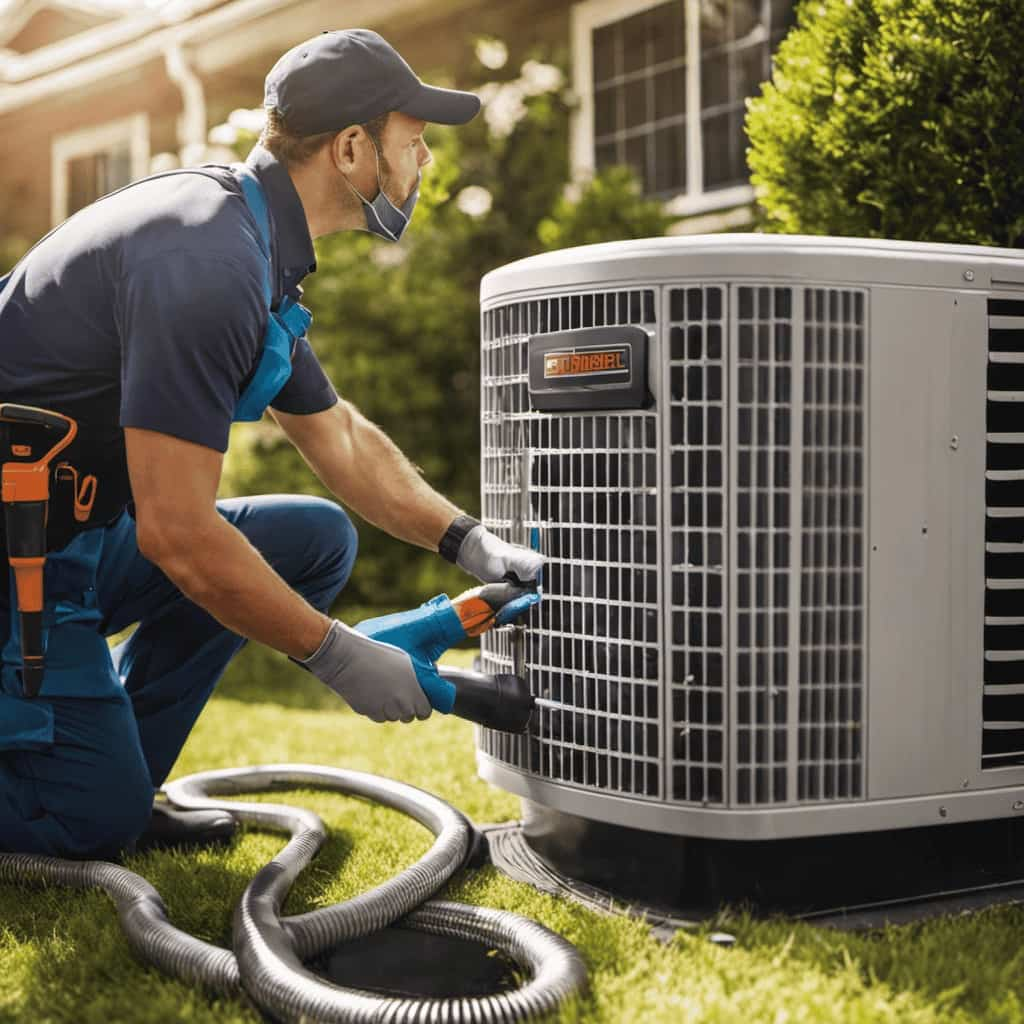
-
Global Warming Potential (GWP): This metric measures the potential of a refrigerant to contribute to global warming over a specific period. Opting for refrigerants with lower GWP values can significantly reduce the heat pump’s overall environmental impact.
-
Ozone Depletion Potential (ODP): Some refrigerants contain chemicals that deplete the Earth’s ozone layer. By choosing refrigerants with low or zero ODP, we can minimize harm to the ozone layer and protect our planet’s delicate balance.
-
Energy Efficiency: The efficiency of heat pumps depends on the refrigerant used. Optimal refrigerants can enhance the heat pump’s performance, resulting in reduced energy consumption and lower environmental impact.
Environmental Regulations and Heat Pumps
Our choice of refrigerants and adherence to environmental regulations have a significant impact on heat pumps’ overall environmental footprint. Environmental regulations play a crucial role in ensuring that heat pumps operate efficiently and sustainably. These regulations focus on two key aspects: environmental impact and energy efficiency.
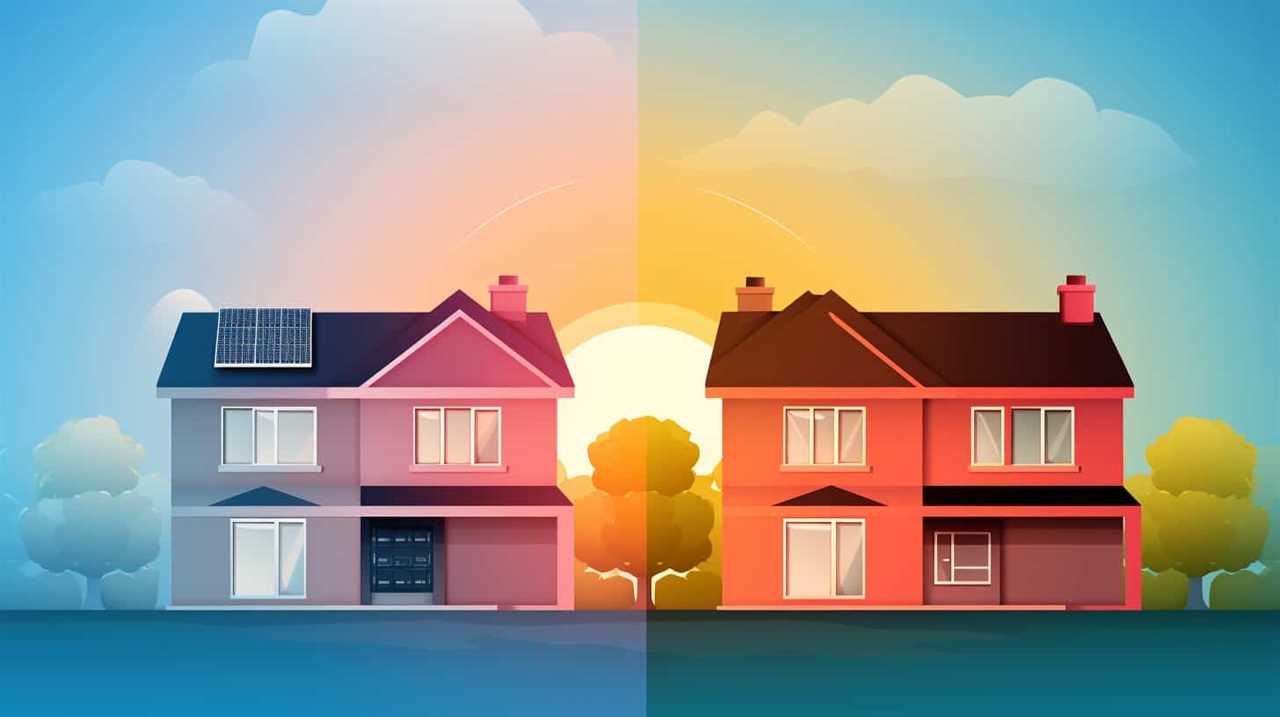
By setting standards for refrigerants used in heat pumps, regulations aim to minimize harmful emissions and promote the use of environmentally friendly alternatives. Compliance with these regulations is essential for the growth and sustainability of the heat pump market. Adhering to environmental regulations ensures that heat pumps are designed and manufactured to meet strict standards, resulting in reduced environmental impact and improved energy efficiency.
As we explore the role of refrigerants in heat pump environmental impact, it becomes clear that adhering to environmental regulations is crucial for the overall sustainability of heat pump systems. This leads us to the next section, where we’ll discuss alternatives to harmful refrigerants.
Alternatives to Harmful Refrigerants
As we explore the role of refrigerants in heat pump environmental impact, it’s important to consider alternatives to harmful refrigerants that can minimize their negative effects. By adopting these alternatives, we can contribute to reducing ozone depletion and greenhouse gas emissions.
Here are three noteworthy alternatives:

-
Hydrofluoroolefins (HFOs): HFOs are a new generation of refrigerants that have a significantly lower global warming potential compared to traditional refrigerants like hydrochlorofluorocarbons (HCFCs) and hydrofluorocarbons (HFCs). They offer a promising solution for reducing greenhouse gas emissions.
-
Natural refrigerants: Utilizing natural refrigerants such as carbon dioxide (CO2), ammonia (NH3), and hydrocarbons (HCs) can greatly minimize the environmental impact of heat pumps. These refrigerants have zero ozone depletion potential and negligible global warming potential, making them environmentally friendly options.
-
HFC/HFO blends: Blending HFCs with HFOs can provide a transitional solution towards more sustainable refrigerants. These blends offer improved energy efficiency, reduced environmental impact, and comply with regulations aimed at phasing out ozone-depleting substances.
Mitigating Heat Pump Emissions: Best Practices and Technologies
Reducing heat pump emissions requires implementing effective strategies and adopting cutting-edge technologies. To mitigate emissions and promote a more sustainable future, it’s crucial to utilize eco-friendly technologies and best practices.
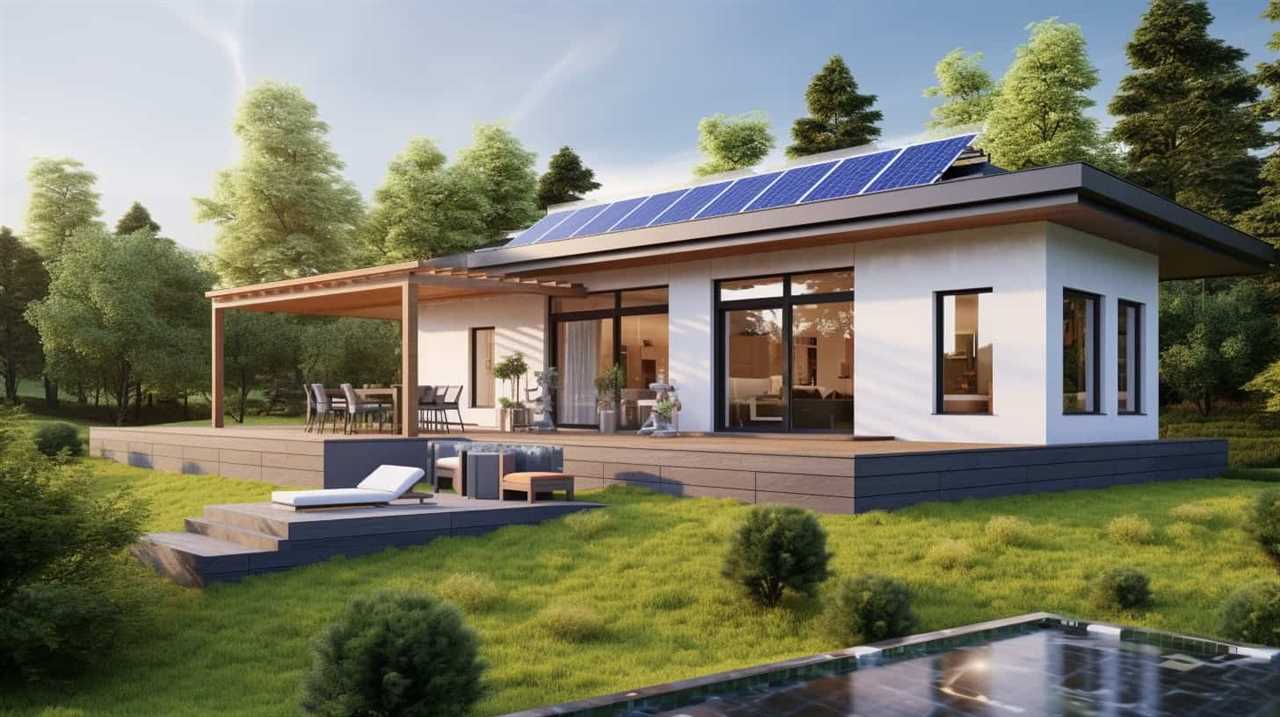
One such practice is the use of refrigerants with low global warming potential (GWP). By choosing refrigerants with lower GWP, we can significantly reduce the environmental impact of heat pumps.
Additionally, improving the energy efficiency of heat pump systems can also help mitigate emissions. This can be achieved through the use of advanced controls, such as variable speed compressors and smart thermostats, which optimize the system’s performance and reduce energy consumption.
By adopting these eco-friendly technologies and implementing best practices, we can minimize heat pump emissions and contribute to a greener and more sustainable environment.
Transitioning into the subsequent section about ‘comparing heat pumps to conventional HVAC systems: environmental considerations’, it’s important to understand the environmental advantages and disadvantages of different heating and cooling systems.
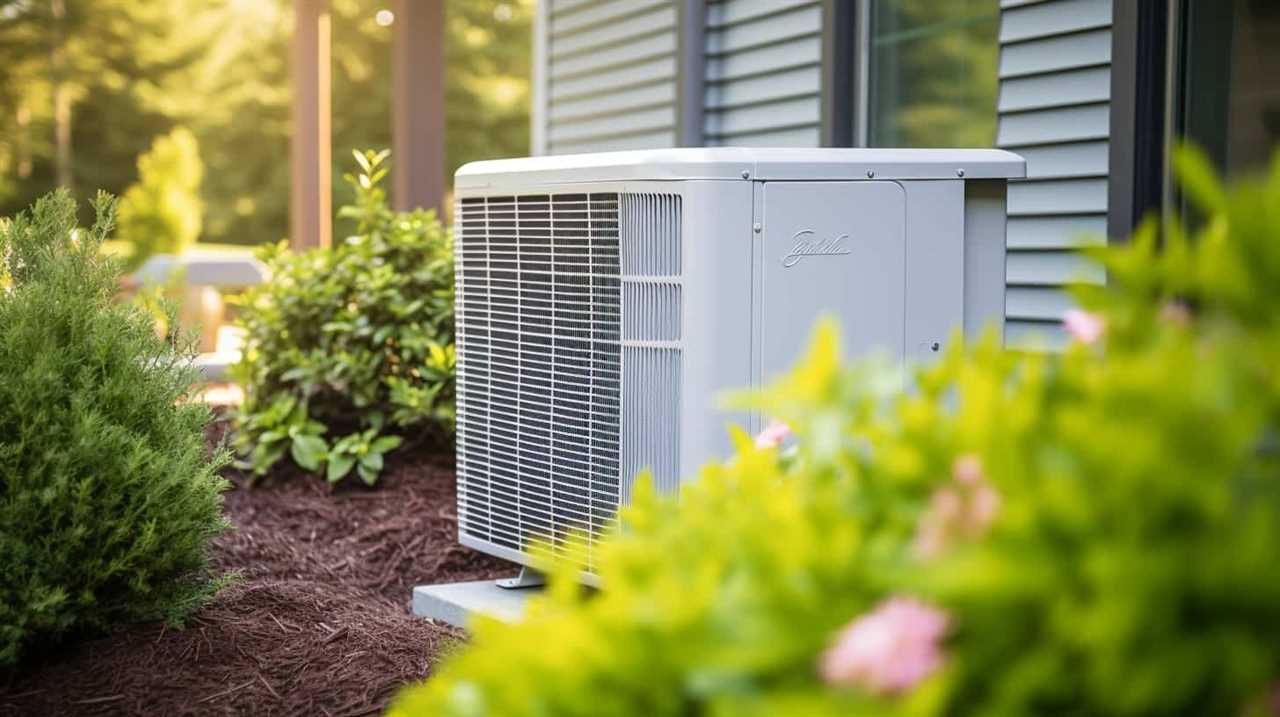
Comparing Heat Pumps to Conventional HVAC Systems: Environmental Considerations
When considering the environmental impact, it’s important to compare heat pumps to conventional HVAC systems. Here are three key environmental considerations:
-
Carbon Emissions:
Heat pumps have significantly lower carbon emissions compared to conventional HVAC systems. This is because heat pumps transfer heat from the environment, reducing the need for burning fossil fuels. By using renewable energy sources, such as solar or geothermal, heat pumps can further decrease carbon emissions. -
Energy Consumption:
Heat pumps are more energy-efficient than conventional HVAC systems. They use electricity to move heat rather than generating it, resulting in lower energy consumption. This not only reduces greenhouse gas emissions but also saves on energy costs. -
Air Quality:
Heat pumps can improve indoor air quality by reducing the need for combustion-based heating. Without burning fuel, heat pumps eliminate the release of harmful pollutants and allergens into the air, promoting healthier living environments.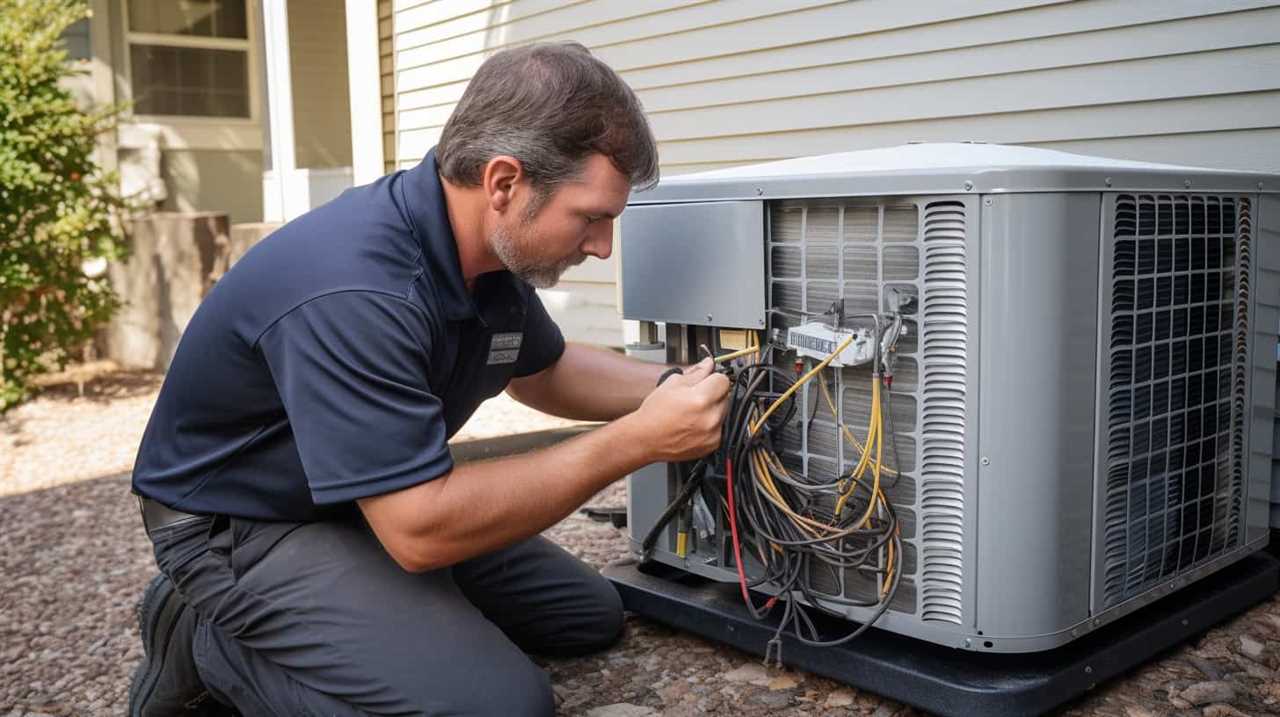
Frequently Asked Questions
What Is the Average Lifespan of a Heat Pump System?
The average lifespan of a heat pump system is typically around 15 to 20 years. Heat pump efficiency and environmental benefits make them a sustainable and cost-effective choice for heating and cooling.
How Does the Cost of Heat Pump Installation Compare to Traditional HVAC Systems?
When comparing the cost of heat pump installation to traditional HVAC systems, it’s important to consider the long-term savings. Heat pumps are more energy efficient, resulting in lower utility bills and a quicker return on investment.
Are Heat Pumps Suitable for All Climates?
Heat pumps can be suitable for all climates, depending on their efficiency and performance. We must consider factors such as temperature ranges, insulation, and regional climate conditions to determine the optimal heat pump system for each location.
Can Heat Pumps Be Used for Both Residential and Commercial Buildings?
Yes, heat pumps can be used for both residential and commercial buildings. They offer numerous benefits, such as reducing carbon emissions and providing efficient heating and cooling solutions for industrial applications.
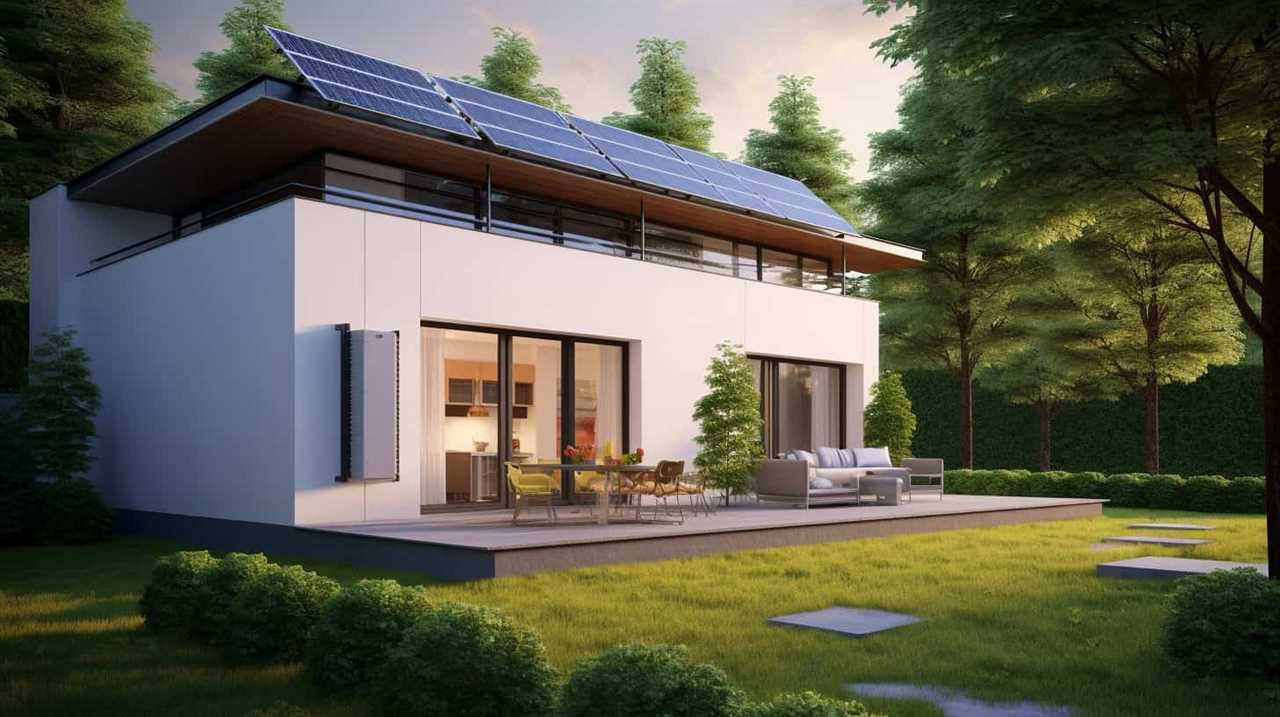
What Is the Maintenance Required for Heat Pump Systems?
Maintenance requirements for heat pump systems include regular filter cleaning/replacement, coil cleaning, and inspection of electrical connections. Proper maintenance ensures optimal energy efficiency and prevents system breakdowns, saving both money and the environment.
Conclusion
In conclusion, heat pumps have a significant role to play in reducing environmental impact.
With an average coefficient of performance (COP) of 3.5, heat pumps are highly efficient in both heating and cooling, resulting in reduced energy consumption and greenhouse gas emissions.
Moreover, by utilizing environmentally-friendly refrigerants and adopting best practices and technologies, heat pump emissions can be further mitigated.
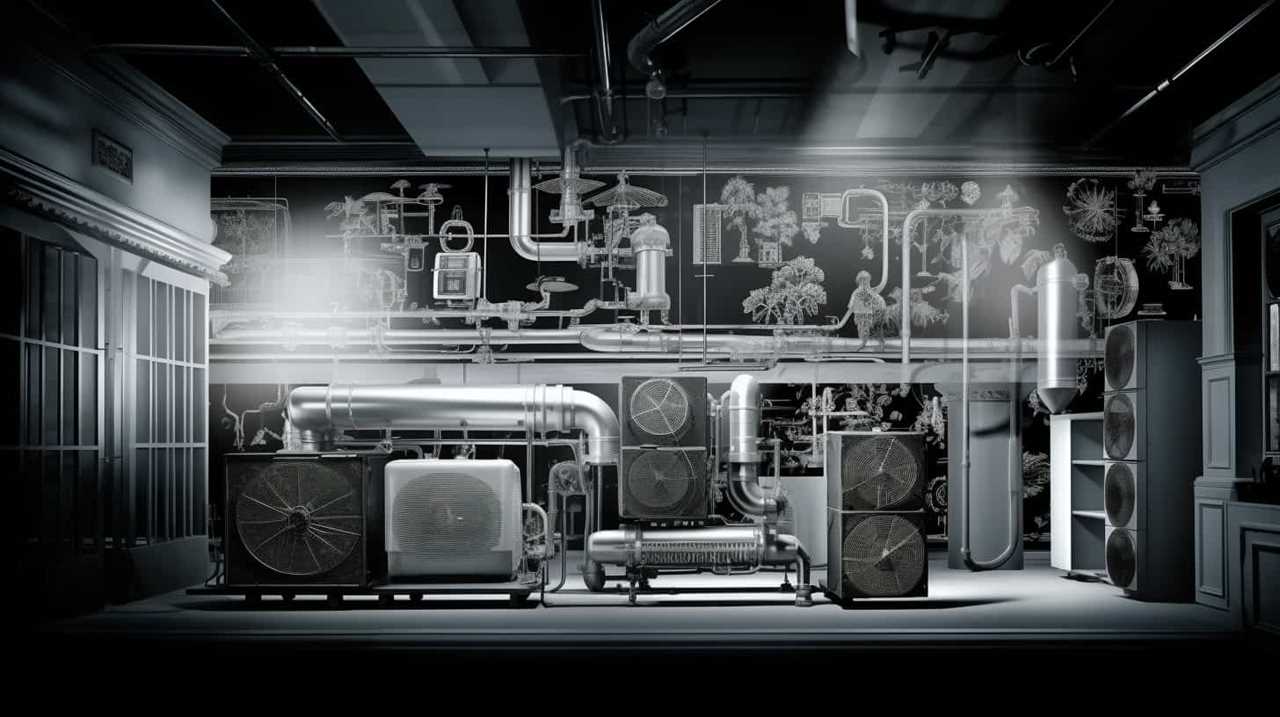
Compared to conventional HVAC systems, heat pumps offer a more sustainable solution for maintaining comfortable indoor temperatures while minimizing environmental harm.
Refrigeration Cycle
High-Efficiency HVAC Systems: Heat Pump Breakthroughs Revealed
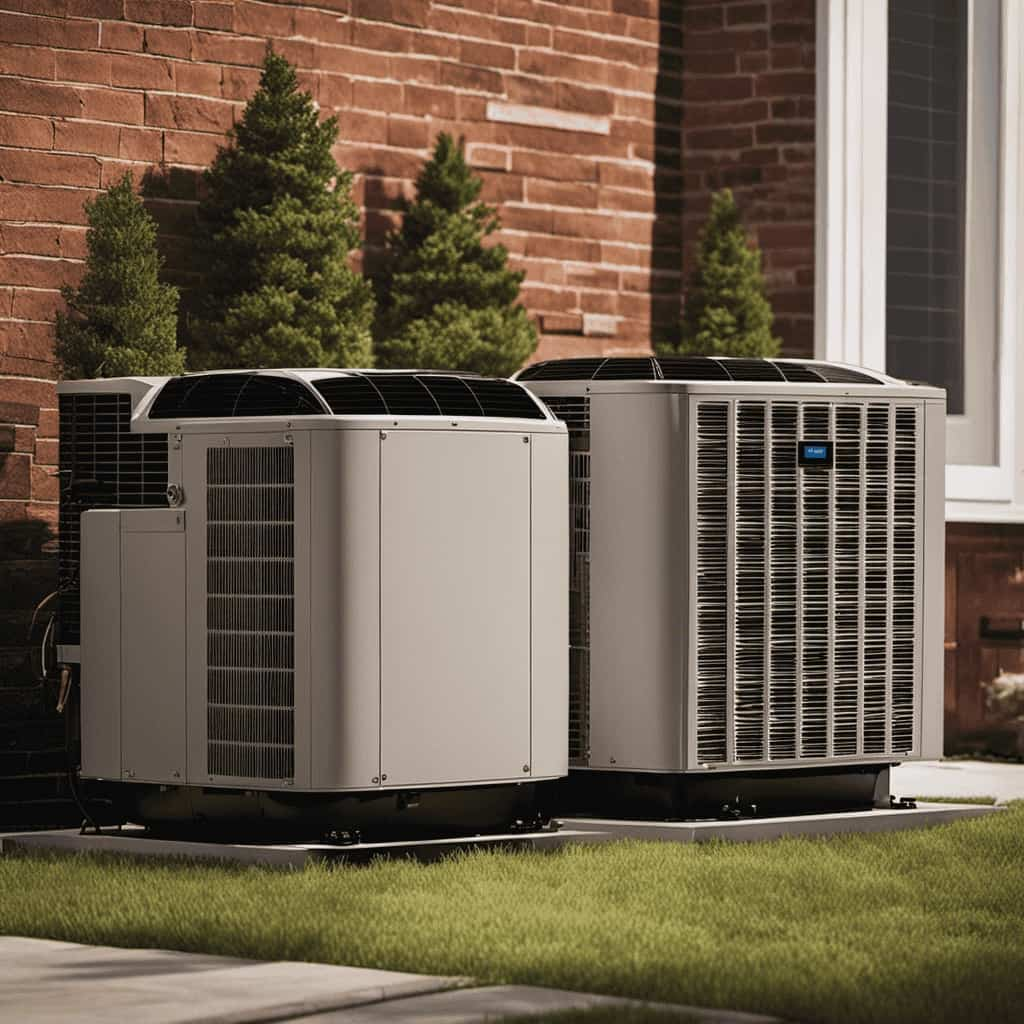
We are excited to announce the newest advancements in high-efficiency HVAC systems.
Picture this: heat pumps that revolutionize energy efficiency, like a cool breeze on a scorching summer day.
In this article, we will delve into the world of heat pump technology, uncovering the key factors that contribute to their efficiency.
Stay tuned as we explore the cutting-edge innovations that make upgrading to a high-efficiency HVAC system a game-changer for your home.

Get ready to liberate your energy consumption!
Key Takeaways
- High-efficiency HVAC systems optimize energy usage and provide superior comfort.
- Regular maintenance, such as cleaning air filters and inspecting ductwork, ensures optimal performance.
- Upgrading to a high-efficiency HVAC system provides optimal comfort while reducing energy consumption and costs.
- The integration of advanced technologies in high-efficiency HVAC systems enhances overall performance and user experience.
Overview of High-Efficiency HVAC Systems
As we delve into the topic of high-efficiency HVAC systems, let’s start by providing an overview of these innovative heating, ventilation, and air conditioning systems.
High-efficiency HVAC systems are designed to optimize energy usage and provide superior comfort in residential and commercial spaces.
One key aspect of maintaining these systems is regular HVAC system maintenance. This includes cleaning or replacing air filters, checking and sealing ductwork, and inspecting and cleaning the outdoor unit.

By properly maintaining your HVAC system, you can ensure its optimal performance and longevity.
Additionally, implementing energy-saving tips can further enhance the efficiency of these systems. Simple steps such as adjusting the thermostat, sealing air leaks, and using ceiling fans can significantly reduce energy consumption and lower utility bills.
Understanding Heat Pump Technology
Let’s dive into the inner workings of heat pump technology and understand how it functions to efficiently heat and cool your space.
Heat pump operation relies on two essential heat transfer mechanisms:
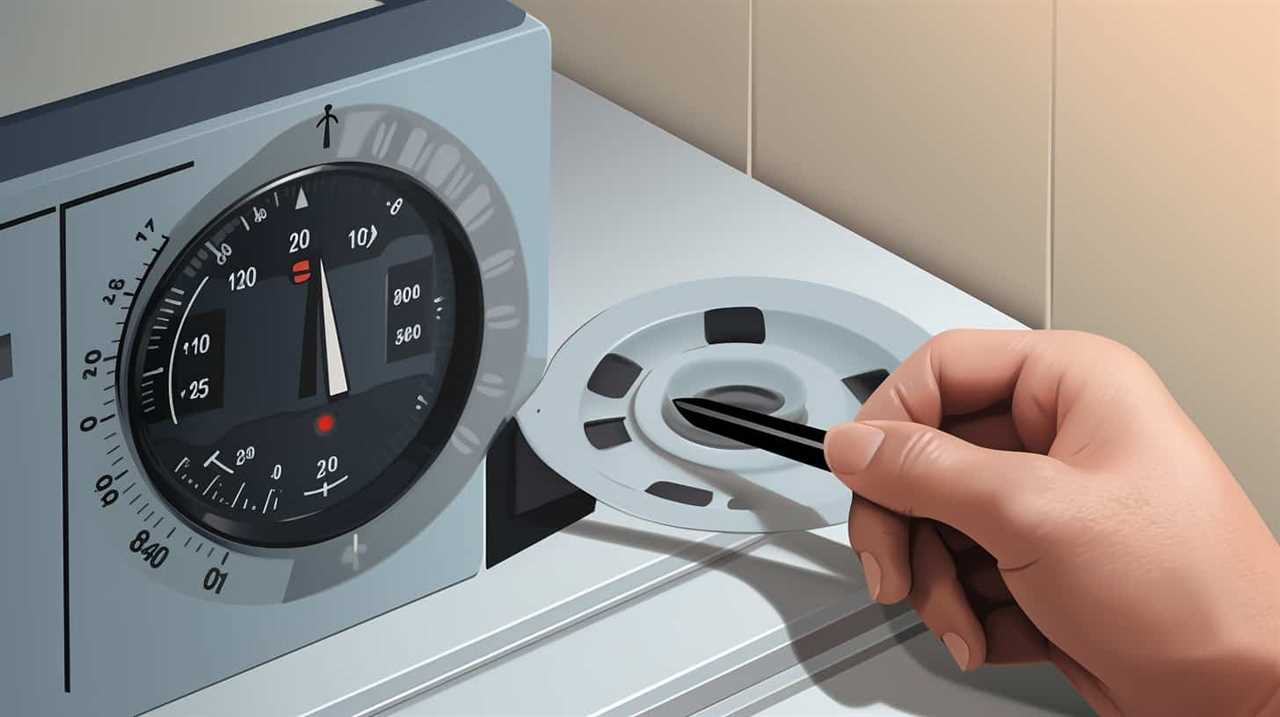
-
Refrigerant: Heat pumps utilize a refrigerant, a substance that can change from a gas to a liquid and vice versa at low temperatures. This refrigerant is responsible for absorbing and releasing heat energy throughout the system.
-
Evaporation and Condensation: The refrigerant evaporates at a low temperature, absorbing heat from the surrounding air or ground. It then undergoes compression, raising its temperature and pressure. Next, it condenses, releasing the absorbed heat to the space being heated.
-
Reversing Valve: The heat pump can change the direction of refrigerant flow using a reversing valve, allowing it to switch between heating and cooling modes.
-
Compressor: The compressor is responsible for increasing the pressure and temperature of the refrigerant, ensuring efficient heat transfer.

-
Heat Exchanger: Heat pumps have two heat exchangers, one indoor and one outdoor. These devices facilitate the transfer of heat between the refrigerant and the air or ground.
Key Factors for Heat Pump Energy Efficiency
We can achieve optimal heat pump energy efficiency by considering key factors such as proper sizing, regular maintenance, and effective insulation.
Heat pump maintenance is crucial for ensuring its peak performance and longevity. Regularly cleaning or replacing air filters is a simple yet effective way to improve energy efficiency. Additionally, scheduling professional maintenance checks at least once a year can help identify and address any potential issues before they become major problems.
Another important factor is effective insulation. Properly insulating your home can prevent heat loss during winter and heat gain during summer, reducing the workload on your heat pump and saving energy.
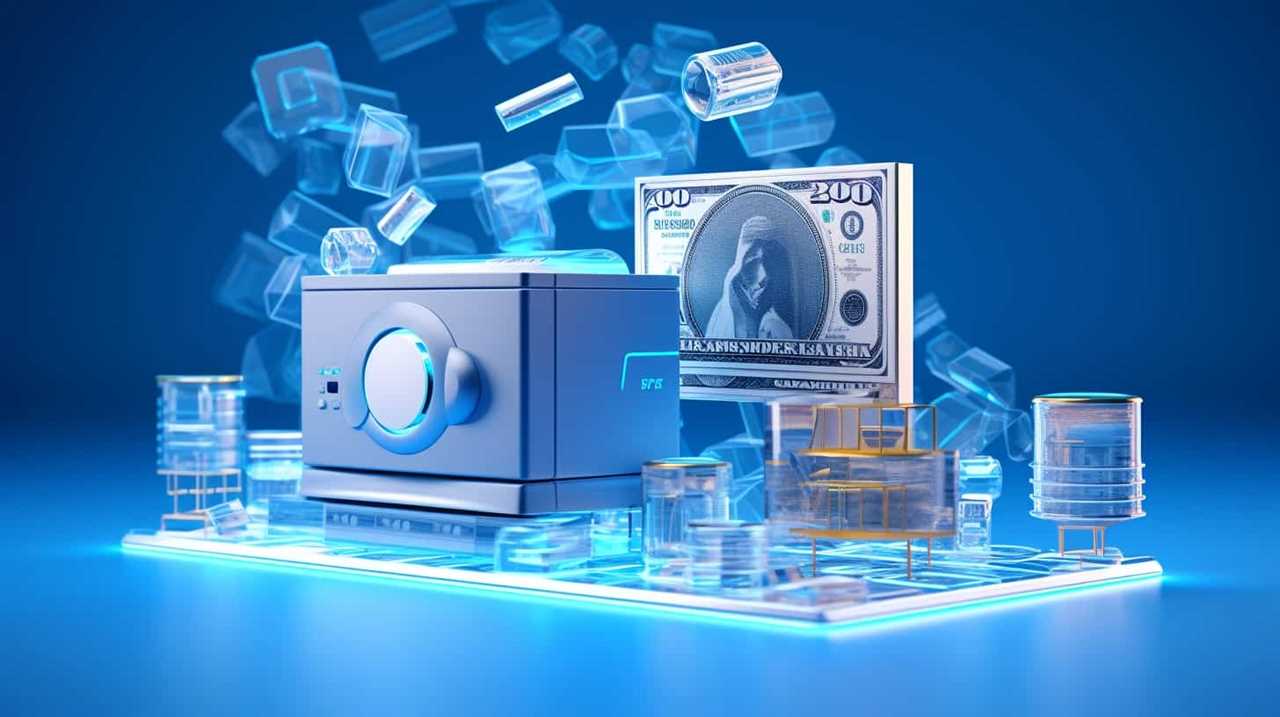
Latest Innovations in High-Efficiency Heat Pumps
Our research has uncovered several exciting breakthroughs in high-efficiency heat pumps that are revolutionizing the HVAC industry. These innovations are driving energy efficiency and providing greater comfort and control for consumers.
Here are five key advancements in high-efficiency heat pumps:
-
Advancements in heat pump compressors: New compressor designs, such as variable speed and scroll compressors, are improving the overall efficiency of heat pumps by allowing them to adjust their output based on the heating and cooling demands.
-
Integration of smart technology: High-efficiency heat pumps now come equipped with smart features that enable users to control and monitor their HVAC systems remotely. This integration allows for optimized energy usage and personalized comfort settings.

-
Enhanced refrigerant technology: The development of new refrigerants with lower global warming potential (GWP) has significantly reduced the environmental impact of high-efficiency heat pumps.
-
Improved defrosting capabilities: Heat pumps now have advanced defrosting algorithms that optimize defrost cycles, reducing energy waste and improving system performance in cold climates.
-
Enhanced system diagnostics: High-efficiency heat pumps are equipped with advanced diagnostic tools that can detect and troubleshoot system issues, allowing for faster and more accurate repairs.
These innovations in high-efficiency heat pumps are making HVAC systems more efficient, reliable, and user-friendly, leading to energy savings and improved comfort for consumers.
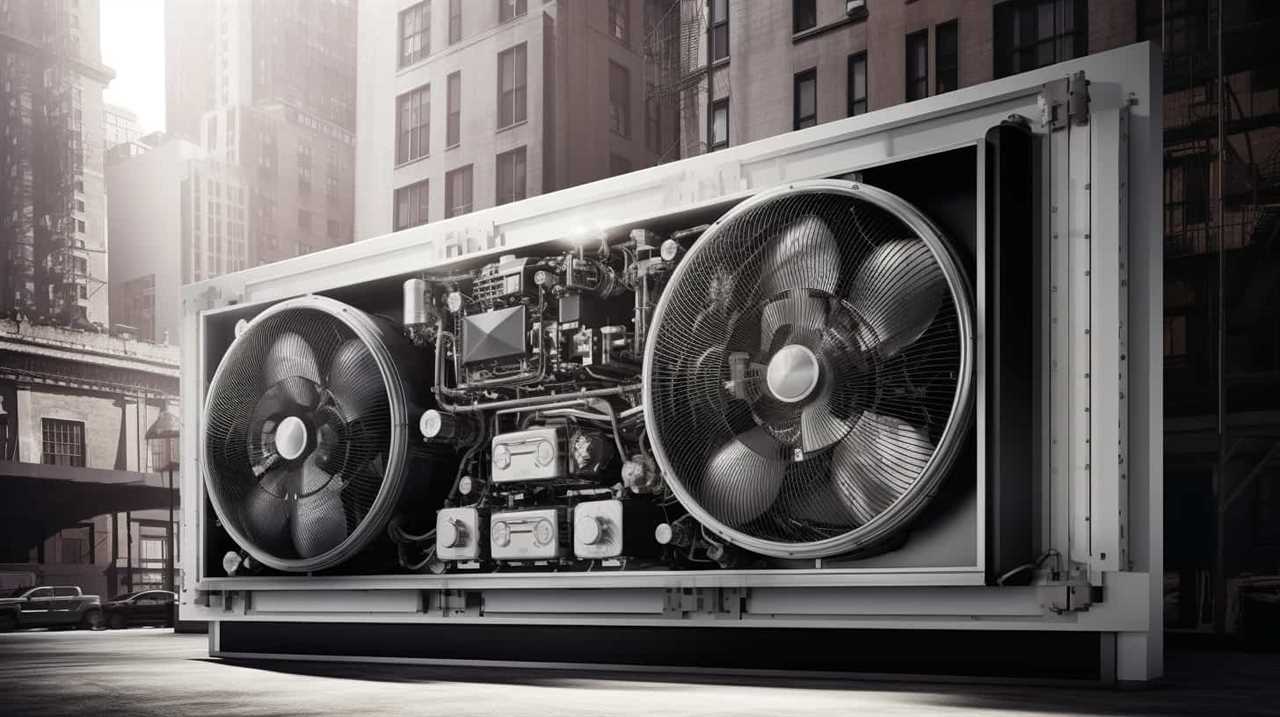
Benefits of Upgrading to a High-Efficiency HVAC System
Upgrading to a high-efficiency HVAC system offers homeowners significant energy savings and improved indoor comfort. These systems are designed to operate more efficiently, resulting in lower energy consumption and reduced utility bills. By utilizing advanced technologies such as variable-speed motors and smart thermostats, high-efficiency HVAC systems can adapt to the specific needs of a home, providing precise temperature control and optimal energy usage. The environmental impact of upgrading to a high-efficiency system should also be considered. These systems consume less energy, which reduces greenhouse gas emissions and helps conserve natural resources. Additionally, some high-efficiency HVAC systems use eco-friendly refrigerants that have a lower impact on the ozone layer. Overall, upgrading to a high-efficiency HVAC system not only benefits homeowners financially but also contributes to a greener and more sustainable future.
| Benefits | Energy Savings | Environmental Impact |
|---|---|---|
| Lower utility bills | Reduced energy consumption | Reduced greenhouse gas emissions |
| Improved comfort | Precise temperature control | Conservation of natural resources |
| Advanced technologies | Optimal energy usage | Use of eco-friendly refrigerants |
Frequently Asked Questions
Are High-Efficiency HVAC Systems More Expensive to Install Than Traditional Systems?
High efficiency HVAC system installation costs can be higher than traditional systems initially, but in the long run, they can save money due to lower energy consumption. Additionally, high efficiency systems tend to have a longer lifespan.
Can a High-Efficiency Heat Pump Be Used in Both Heating and Cooling Modes?
Yes, a high-efficiency heat pump can be used in both heating and cooling modes. It offers energy efficiency benefits and reduces the environmental impact. This breakthrough technology is a game-changer for HVAC systems.
How Long Does It Typically Take for a High-Efficiency HVAC System to Pay for Itself Through Energy Savings?
Typically, the payback period for a high-efficiency HVAC system through energy savings varies. It depends on factors such as the initial cost, energy prices, and usage patterns. However, over time, these systems can help recoup their cost through lower energy bills.
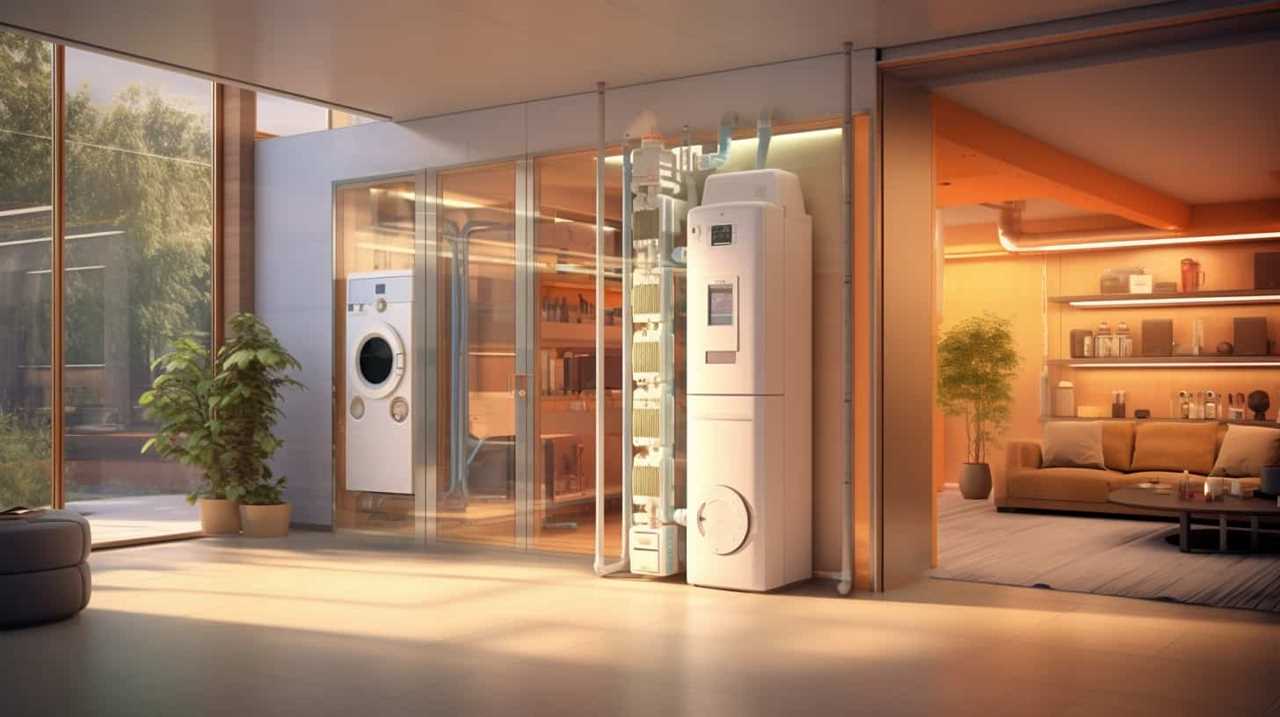
Are There Any Government Incentives or Tax Credits Available for Upgrading to a High-Efficiency HVAC System?
Yes, there are government incentives and tax credits available for upgrading to a high-efficiency HVAC system. These incentives and credits can help offset the cost of installation and make the upgrade more affordable.
Can a High-Efficiency Heat Pump Be Used in Conjunction With a Traditional Furnace for Backup Heating During Extremely Cold Temperatures?
Yes, a high-efficiency heat pump can be used in conjunction with a traditional furnace for backup heating during extremely cold temperatures. This provides the advantages of geothermal heating and the reliability of a traditional furnace.
Conclusion
In conclusion, upgrading to a high-efficiency HVAC system with the latest innovations in heat pump technology can greatly improve energy efficiency and reduce utility costs. These breakthroughs in heat pump technology allow for better heat transfer and more precise temperature control, resulting in optimal comfort and savings.
So, why not take the leap and embrace the new era of high-efficiency HVAC systems? It’s time to reap the benefits and make your home a haven of efficiency and comfort. After all, ‘out with the old, in with the new’!

Refrigeration Cycle
3 Key Comparisons: Heat Pumps Vs Traditional Heating

Welcome, ladies and gentlemen, to our evaluation comparing heat pumps with traditional heating systems.
Today, we embark on a journey where facts will illuminate the path towards informed decision making. Join us as we delve into the realm of energy efficiency, cost effectiveness, and environmental impact.
With these key comparisons, we aim to shed light on the benefits and drawbacks of each option, empowering you to make a choice that aligns with your values and desires for a greener future.
Let’s begin.
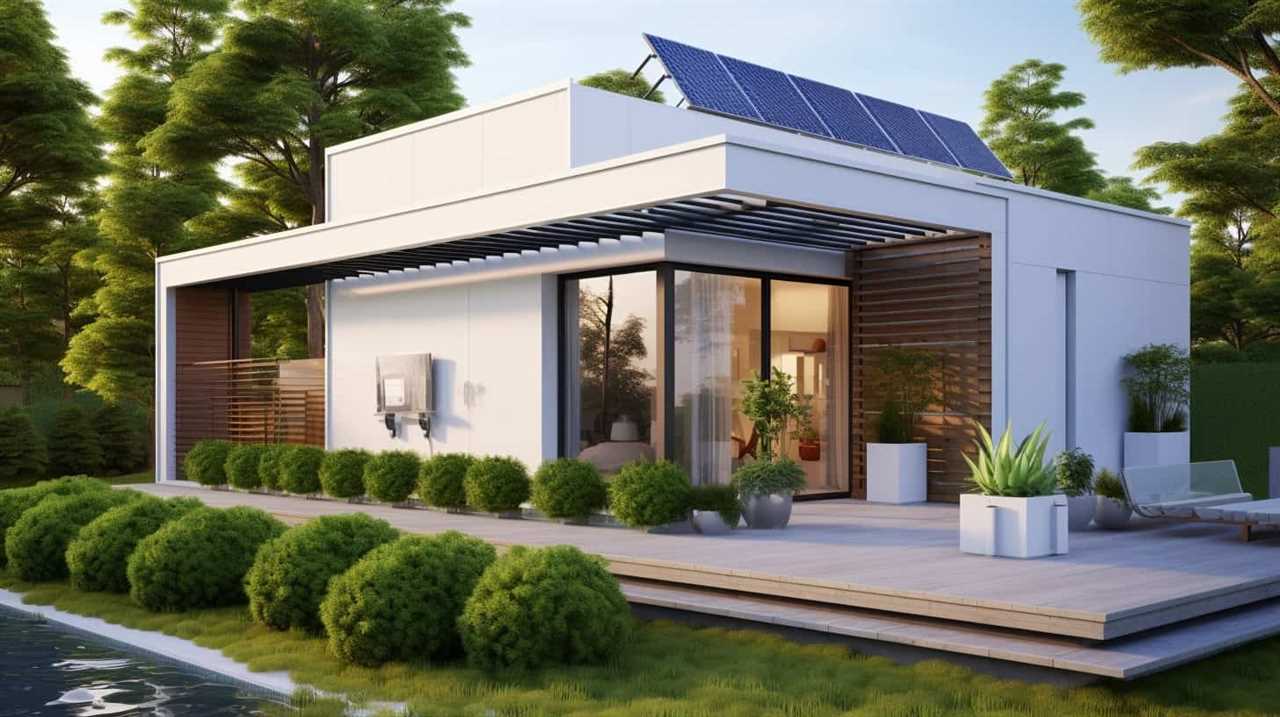
Key Takeaways
- Heat pumps are more energy efficient than traditional heating systems.
- Heat pumps reduce carbon emissions and contribute to a greener future.
- Heat pumps provide efficient and effective heating and cooling solutions.
- Heat pumps can be powered by renewable energy sources.
Energy Efficiency Comparison
When comparing heat pumps to traditional heating systems, we find that heat pumps are more energy efficient. Heat pump technology utilizes the principles of refrigeration to transfer heat from one space to another.
Unlike traditional heating systems that generate heat by burning fuel, heat pumps extract heat from the air, ground, or water sources, making them more energy efficient. This energy efficiency leads to significant energy savings for homeowners and businesses.
Heat pumps can provide up to four times the amount of energy they consume, resulting in lower energy bills and reduced carbon emissions. By harnessing the natural heat available in the environment, heat pump technology offers a sustainable and cost-effective solution for heating and cooling needs.
Cost Comparison
In terms of cost, heat pumps offer a more budget-friendly option compared to traditional heating systems. One of the main advantages of heat pumps is their long-term savings potential. While the initial installation cost of a heat pump may be higher than that of a traditional heating system, the energy savings over time can offset this initial investment.

Heat pumps are highly energy efficient, as they transfer heat rather than generate it, resulting in lower energy consumption and reduced utility bills. Additionally, heat pumps require less maintenance compared to traditional heating systems, resulting in lower maintenance expenses over time. This further contributes to the cost-effectiveness of heat pumps.
Environmental Impact Comparison
Using heat pumps instead of traditional heating systems can significantly reduce our environmental impact while still providing efficient and effective heating.
The environmental benefits of heat pumps are evident when considering carbon footprint analysis and the integration of renewable energy.
-
Carbon footprint analysis:

-
Heat pumps utilize electricity to transfer heat, resulting in lower carbon emissions compared to fossil fuel-based heating systems.
-
Traditional heating systems, such as gas or oil furnaces, release greenhouse gases that contribute to climate change.
-
By choosing heat pumps, we can reduce our carbon footprint and help mitigate the effects of global warming.
-
Renewable energy integration:

-
Heat pumps can be powered by renewable energy sources like solar or wind power.
-
This integration promotes the use of clean and sustainable energy, reducing our reliance on fossil fuels.
-
By harnessing renewable energy for heat pumps, we can further minimize our environmental impact and contribute to a greener future.
Frequently Asked Questions
How Does the Installation Process of a Heat Pump Compare to That of a Traditional Heating System?
The installation process of a heat pump compared to that of a traditional heating system is more complex and requires professional expertise. However, once installed, heat pumps have lower maintenance requirements and provide greater energy efficiency.

Are There Any Specific Maintenance Requirements for Heat Pumps That Differ From Traditional Heating Systems?
When it comes to maintenance requirements, heat pumps differ from traditional heating systems. While the installation process may be similar, heat pumps require regular cleaning of filters and coils, as well as periodic inspections for optimal performance.
Can a Heat Pump Be Used in Conjunction With a Traditional Heating System to Maximize Efficiency?
Yes, a heat pump can be used in conjunction with a traditional heating system to maximize efficiency. By utilizing the heat pump’s efficiency and the traditional system’s capabilities, we can achieve optimal heating performance.
What Are the Noise Levels Typically Associated With Heat Pumps Compared to Traditional Heating Systems?
What are the noise levels typically associated with heat pumps compared to traditional heating systems? Are heat pumps quieter? Noise levels vary, but heat pumps generally operate at lower decibel levels, making them a quieter option for energy-efficient heating.
Are There Any Government Incentives or Tax Credits Available for Installing a Heat Pump Versus a Traditional Heating System?
There are government incentives and tax credits available for installing a heat pump compared to a traditional heating system. These incentives can help offset the cost and make it more affordable for homeowners.
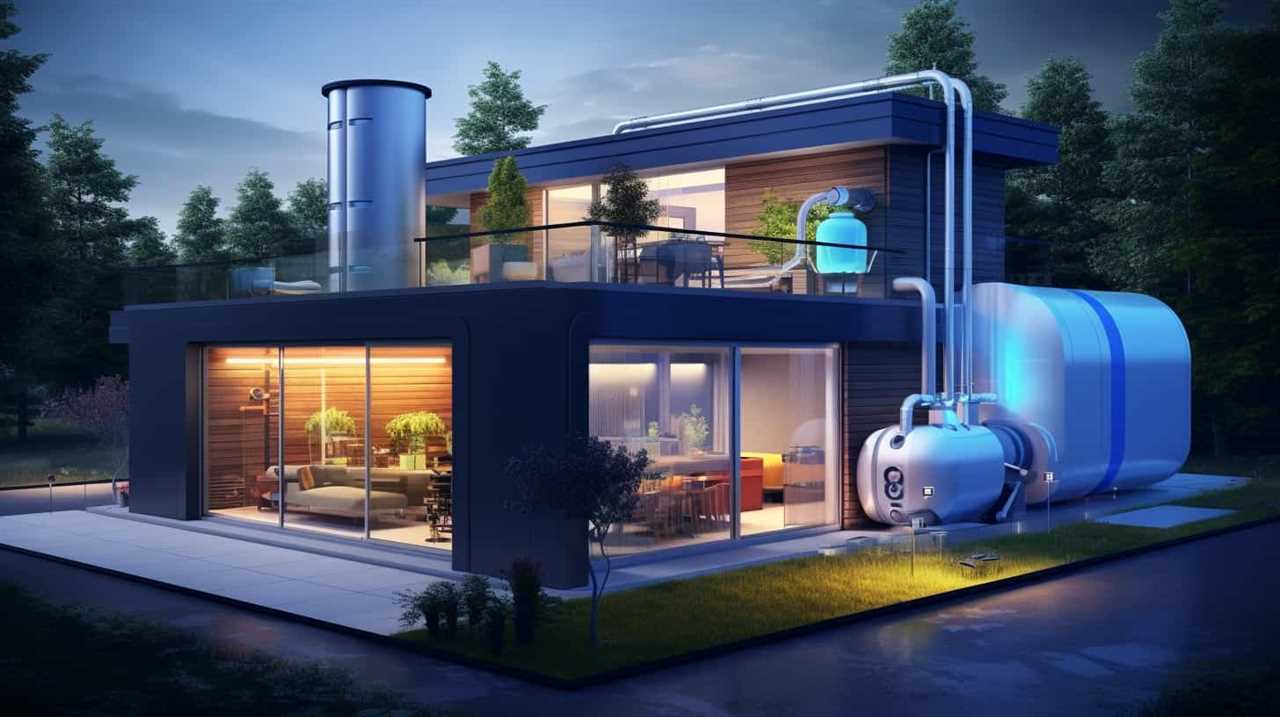
Conclusion
Overall, when comparing heat pumps to traditional heating methods, it’s clear that heat pumps offer significant advantages.
With their higher energy efficiency, cost-effectiveness, and minimal environmental impact, heat pumps paint a picture of a greener and more sustainable future.
By harnessing the power of technology, we can transition away from outdated and inefficient heating systems, symbolizing a shift towards a cleaner and more efficient way of living.
Refrigeration Cycle
Boosting ROI: Energy-Efficient Heat Pumps Expense Analysis

Ladies and gentlemen, get ready as we explore the realm of energy-saving heat pumps and how they affect return on investment (ROI).
In this article, we’ll explore the factors that affect the cost-benefit analysis of heat pump efficiency and analyze the initial expenses involved.
But wait, there’s more! We’ll also calculate the long-term savings these pumps offer and reveal how to maximize ROI through upgrades.
Get ready to revolutionize your energy usage and boost your bottom line!
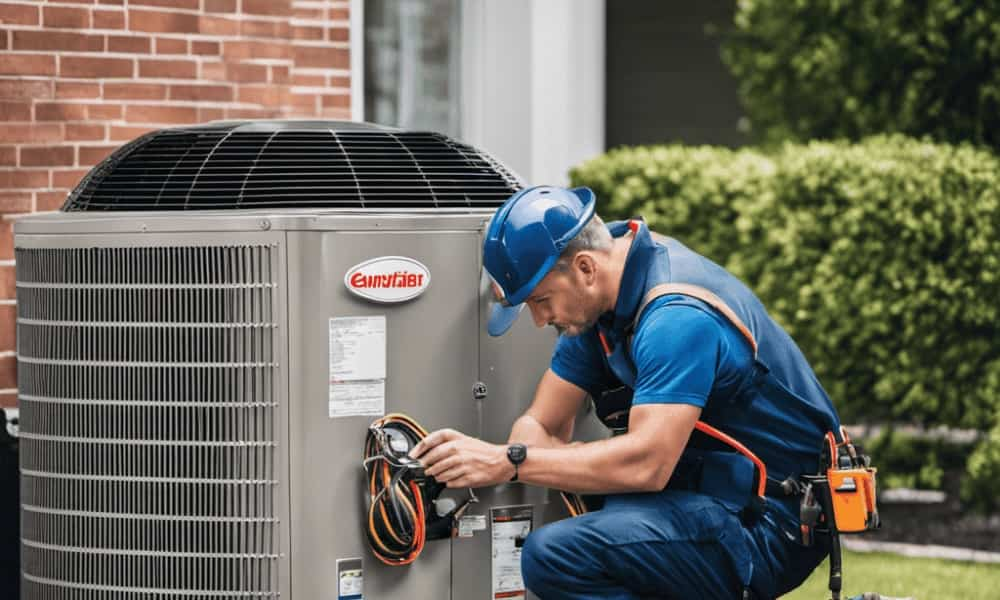
Key Takeaways
- ROI is crucial in determining the value of energy-efficient heat pumps.
- Factors such as energy prices and environmental impact should be considered in the cost-benefit analysis.
- Upfront expenses, maintenance costs, and incentives should be factored in when analyzing the initial expenses.
- Energy-efficient heat pumps can lead to long-term savings through reduced energy consumption and lower utility bills.
The Importance of ROI in Energy-Efficient Heat Pumps
We believe that ROI plays a crucial role in determining the value of energy-efficient heat pumps. For businesses and homeowners alike, it’s essential to consider the financial return on investment when deciding to adopt these innovative solutions.
The importance of ROI becomes even more evident when considering the impact on the environment. Energy-efficient heat pumps not only reduce energy consumption and utility costs but also significantly lower carbon footprint.
This is where government incentives come into play. By providing financial support and incentives for the adoption of energy-efficient heat pumps, governments can encourage individuals and organizations to invest in these environmentally friendly technologies. This not only benefits the environment but also helps businesses and homeowners save money in the long run.
Therefore, understanding the importance of ROI in energy-efficient heat pumps is crucial for making informed decisions and driving innovation in sustainable energy solutions.

Factors Affecting the Cost-Benefit Analysis of Heat Pump Efficiency
When evaluating the cost-benefit analysis of heat pump efficiency, it’s important to consider various factors that can impact the overall financial return on investment. Two key factors that must be taken into account are energy prices and the environmental impact of the heat pump system.
Energy prices play a significant role in determining the cost savings associated with heat pump efficiency. Higher energy prices can result in greater cost savings over time, as the energy-efficient heat pump consumes less electricity compared to traditional heating and cooling systems. On the other hand, lower energy prices may reduce the financial benefits of investing in a heat pump.
Furthermore, the environmental impact of the heat pump system is another important consideration. Heat pumps are known for their lower carbon emissions compared to conventional heating and cooling systems. By reducing reliance on fossil fuels, heat pumps contribute to a greener and more sustainable future. This environmental benefit must be factored into the cost-benefit analysis, as it adds value to the overall return on investment.
Analyzing the Initial Expenses of Energy-Efficient Heat Pumps
To accurately assess the financial viability of energy-efficient heat pumps, it’s essential to analyze the initial expenses involved and their impact on the return on investment. When conducting a cost analysis of energy-efficient heat pumps, the following factors should be considered:

-
Initial Investment: The upfront cost of purchasing and installing an energy-efficient heat pump is a significant expense. It includes the cost of the unit itself, any necessary modifications to the existing HVAC system, and professional installation fees.
-
Energy Savings: Energy-efficient heat pumps consume less electricity compared to traditional heating systems. By quantifying the potential energy savings over the lifespan of the heat pump, the long-term financial benefits can be determined.
-
Maintenance and Repair Costs: It’s important to factor in the ongoing maintenance and repair costs associated with energy-efficient heat pumps. Regular maintenance and occasional repairs are necessary to ensure optimal performance and longevity.
-
Incentives and Rebates: Various government incentives and utility company rebates may be available to offset the initial investment. These incentives can significantly reduce the overall cost and improve the return on investment.

Calculating Long-Term Savings With Energy-Efficient Heat Pumps
Our analysis aims to determine the long-term savings achieved by utilizing energy-efficient heat pumps. When considering the cost of implementing energy-efficient heat pumps, it’s essential to assess the long-term benefits and energy savings that can be achieved.
Energy-efficient heat pumps have the potential to significantly reduce energy consumption and lower utility bills. By utilizing advanced technology and innovative designs, these heat pumps can provide efficient heating and cooling solutions while minimizing energy wastage.
The long-term benefits of energy-efficient heat pumps include reduced energy costs, improved energy efficiency, and decreased environmental impact. These factors contribute to substantial savings over time, making energy-efficient heat pumps a wise investment for both residential and commercial applications.
Maximizing ROI Through Energy-Efficient Heat Pump Upgrades
The key to maximizing our ROI through energy-efficient heat pump upgrades lies in carefully selecting the most cost-effective and technologically advanced options available. By improving efficiency and taking advantage of financial benefits, we can significantly increase our returns on investment.

Here are four strategies to consider when upgrading heat pumps:
-
Conduct a thorough energy audit: Before making any upgrades, assess the current energy usage and identify areas for improvement. This will help determine the most effective upgrades to maximize ROI.
-
Choose high-efficiency heat pumps: Look for heat pumps that have a high SEER (Seasonal Energy Efficiency Ratio) rating and HSPF (Heating Seasonal Performance Factor) rating. These ratings indicate the energy efficiency of the heat pump and can greatly impact energy savings.
-
Consider variable-speed technology: Heat pumps with variable-speed compressors adjust their output based on the heating or cooling needs, resulting in more efficient operation and reduced energy consumption.
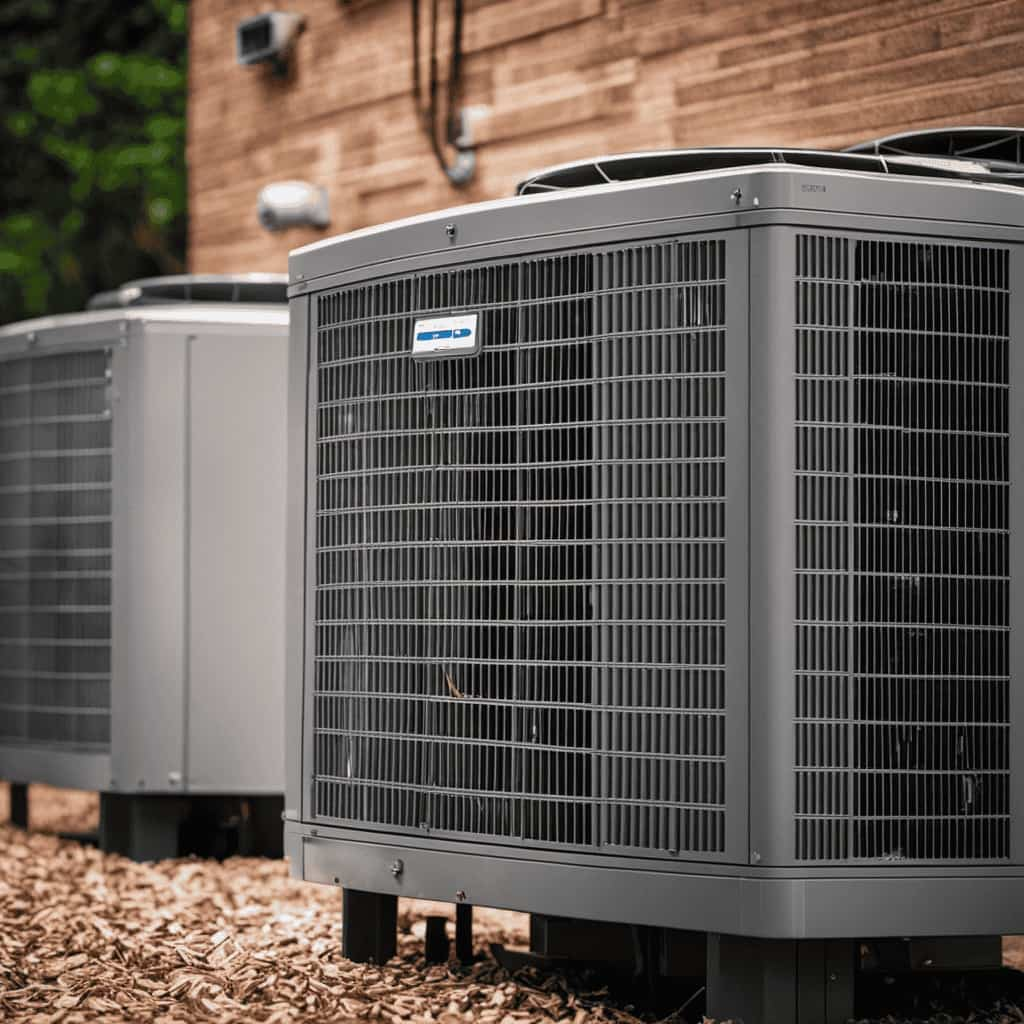
-
Explore financing options: Research available incentives, rebates, and financing programs to offset the initial cost of the upgrades. This can help improve the ROI and make the investment more financially feasible.
Frequently Asked Questions
How Do Heat Pumps Compare to Other Heating and Cooling Systems in Terms of Energy Efficiency?
Heat pumps offer higher energy efficiency compared to other heating and cooling systems. A comparative analysis reveals their lower environmental impact. This innovation provides a technical and analytical solution for boosting ROI and reducing energy expenses.
What Are the Key Factors to Consider When Analyzing the Long-Term Savings of Energy-Efficient Heat Pumps?
When analyzing the long-term savings of energy-efficient heat pumps, key factors to consider include energy savings and maintenance costs. By examining these factors, we can determine the overall return on investment for this innovative technology.
Are There Any Government Incentives or Rebates Available for Installing Energy-Efficient Heat Pumps?
Yes, there are government incentives and rebates available for installing energy-efficient heat pumps. These incentives aim to promote energy savings and make the adoption of such technology more financially feasible for consumers.

How Does the Climate or Geographical Location Affect the Cost-Benefit Analysis of Heat Pump Efficiency?
The climate and geographical location have a significant impact on the cost-benefit analysis of heat pump efficiency. Understanding these factors is crucial when evaluating the potential ROI and determining the most suitable energy-efficient heat pump system.
What Are Some Common Upgrades or Improvements That Can Be Made to Existing Heat Pump Systems to Maximize Roi?
Improving performance and maximizing ROI for existing heat pump systems can be achieved through various retrofit options. Upgrades such as variable speed drives, enhanced controls, and improved insulation can significantly enhance efficiency and reduce operating costs.
Conclusion
In conclusion, by considering the importance of ROI in energy-efficient heat pumps and analyzing the initial expenses as well as long-term savings, it’s evident that maximizing ROI through upgrades is crucial.
Factors affecting the cost-benefit analysis of heat pump efficiency should be taken into account to make informed decisions.

By implementing energy-efficient heat pumps, individuals can enjoy the benefits of reduced energy consumption and increased cost savings.
-

 Residential and Commercial Applications2 weeks ago
Residential and Commercial Applications2 weeks agoBest Amana Heat Pump Reviews
-

 Thermal Energy Transfer2 weeks ago
Thermal Energy Transfer2 weeks agoBreakthroughs in Modern Heat Pump Systems: Thermal Energy Edition
-

 Residential and Commercial Applications2 weeks ago
Residential and Commercial Applications2 weeks agoBest Heat Pump
-

 Geothermal Heat Pumps3 months ago
Geothermal Heat Pumps3 months agoUpgrade Your Comfort with Our Efficient HVAC Systems
-

 Air Conditioning3 months ago
Air Conditioning3 months agoExploring Energy-Efficient Air Conditioning Heat Pumps
-

 Geothermal Heat Pumps3 months ago
Geothermal Heat Pumps3 months agoInnovative Geothermal Heat Pump Manufacturers Revolutionize Energy Efficiency
-

 Thermal Energy Transfer1 month ago
Thermal Energy Transfer1 month agoBoost Your Heat Pump Efficiency: Interactive Guide
-

 Residential and Commercial Applications2 weeks ago
Residential and Commercial Applications2 weeks agoBest Portable Heat Pump Heat & AC










